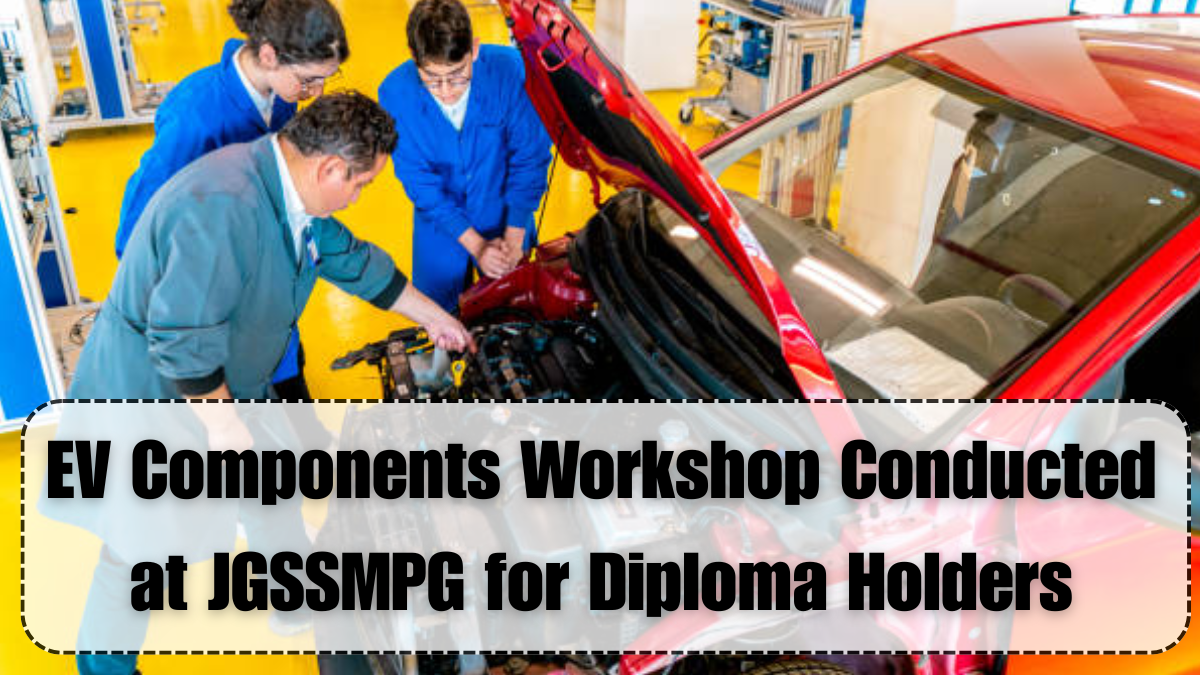EV component workshop was recently conducted at JGSSMPG College as part of its advanced skill development series for diploma students. Focused on real-world electric vehicle systems, the workshop provided hands-on training in EV control modules, battery management systems, and electric motor operations. This initiative is part of the college’s broader vision to make EV training accessible and industry-relevant for aspiring technicians and engineers.
The program attracted over 100 final-year diploma students from electrical, mechanical, and electronics streams, all of whom participated in a 3-day immersive workshop. Students engaged directly with EV parts and gained practical knowledge of how components like controllers, motors, and lithium-ion battery systems work in sync to power electric vehicles. The student upgrade initiative was supported by local EV manufacturers and hardware suppliers.

Core Focus: Powertrain and Battery Systems
The EV component workshop focused on giving students complete visibility into how power flows through an electric vehicle. Sessions were split between theoretical briefings and practical lab hours where students examined real components.
Main components explored included:
-
BLDC (Brushless DC) motors and regenerative braking circuits
-
Battery Management Systems (BMS) with real-time voltage monitoring
-
EV motor controllers and signal mapping
-
Charging connectors (Type 1, 2, CCS) and safety protocols
-
Thermal management systems for battery cooling
Each component was dissected and explained in relation to system performance and safety—making the EV training extremely hands-on and relevant.
Practical Learning in an Industrial Setup
The workshop replicated a real-world EV training lab, where students rotated across component stations, each equipped with demo kits and technical instructors. The workshop was designed to help students not just identify components but also troubleshoot them—preparing them for immediate employment or internships.
Student tasks included:
-
Assembling a basic EV drivetrain using controller and motor
-
Testing charge-discharge cycles of lithium-ion battery modules
-
Calibrating a motor controller through diagnostic tools
-
Wiring a sample EV circuit from scratch
-
Troubleshooting over-voltage and low-current issues
The EV component workshop ensured students walked away with real diagnostic and assembly experience, essential for on-ground EV roles.
Career-Focused Student Upgrade Initiative
As part of JGSSMPG’s student upgrade mission, the workshop also featured sessions on certification pathways and entry-level job options. Students were introduced to short-term government-certified courses in EV repair, hybrid servicing, and energy storage systems. Experts provided guidance on how to upskill using online and offline training platforms, even after graduation.
Career takeaways shared included:
-
Entry-level jobs in EV dealerships and battery assembly lines
-
Junior technician roles in EV service centers
-
Internships in EV R&D departments
-
Self-employment opportunities in EV kit retrofitting
The EV component workshop wasn’t just about parts—it was a stepping stone for career-minded students.
Strong Industry-Academia Collaboration
The success of the workshop was made possible by JGSSMPG’s partnership with local EV suppliers and industrial training centers. The college now plans to institutionalize these EV training modules into the regular diploma curriculum. Feedback from students and faculty was overwhelmingly positive, with many recommending this as a model for other technical institutions.
This program has proven that focused, component-level EV education can transform diploma students into confident, industry-ready professionals, fulfilling India’s growing demand for skilled electric mobility workers.
FAQs
What is the EV component workshop at JGSSMPG?
It is a hands-on training program that teaches diploma students how EV motors, controllers, and batteries function and interact in a real system.
Who can attend this EV training workshop?
Final-year diploma students in electrical, mechanical, and electronics streams were eligible to join the student upgrade event.
What were the main components covered in the workshop?
The workshop covered BLDC motors, battery management systems, motor controllers, EV chargers, and thermal management tools.
Were students given real EV parts to work with?
Yes, all participants handled real EV components and assembled/tested functional systems during the EV component workshop.
Does the workshop provide career support?
Yes, students were offered career guidance, internship listings, and certification recommendations to enhance their post-workshop career paths.
Click here to know more.
